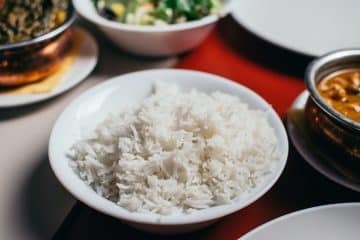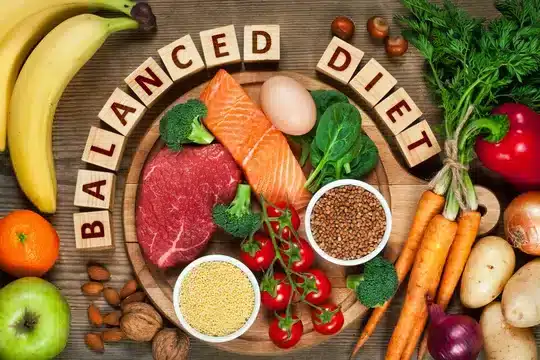There are numerous Nigerian foods with high calories, and we are proud to call them ours. The average Nigerian food is starchy and contains a high amount of glucose, this is why the occurrence of weigh gain, obesity, and even diabetes is rampant among the aged and more recently, the youths. Is it really a bad thing that we consume so much carbohydrates? Not really. However, it is a bad thing that we do not combine these Nigerian foods with high calories with foods that have low calories when we eat them.
[ninja_tables id=”67968″]
Some foods high in calories include banana. Combining banana with our precious groundnuts is almost a tradition. However, we do not know that this combination results in very high caloric surplus. Other Nigerian foods high in calories include white rice, eba, yam, fufu, semovita, noodles, white bread, and many more.
As we go on, you will understand what calories are, what their effect is on the body, why you should watch how much calories you consume, and the Nigerian foods with high calories.
Understanding calories
A calorie is the unit of measurement for the amount of energy provided by different food sources to nourish the body. Deeper research will reveal to you that the term “Calories” is used in physics as the amount of energy required to raise the temperature of one kilogram of water by one-degree Celsius but that is not our concern.
We are concerned about the term “Calorie” in reference to food and energy supplied to the body. our body is a living machine that is constantly running, even while we sleep. This machine needs fuel and that fuel needs to supply energy to the body in the form it can use it. Therefore, when we eat, the food gets digested, and the nutrients contained in the food extracted. Each nutrient provides a small amount of energy and a cumulative of these small energy gives the total calories of that food.
If you buy any NAFDAC approved food item, say, spaghetti, you will find the amount of energy that pack provides on its back. That number is also the caloric value of that spaghetti.
Effects of Calories on the Body
Energy is constantly needed by the body; therefore, we cannot do without consuming calories. However, the number of calories each person needs differs due to different reasons, some of them being age, special nutritional needs, nature of job, resting metabolic rate, and so many more.
Excessive calories consumption leads to a number of health challenges, and leading the pack is weight gain which consequently leads to obesity. Interestingly, obesity is a risk factor for becoming diabetic and having some serious joint problems. This arises because you have consistently consumed more calories than your body needs and the surplus have been stored for future use.
Inadequate calories consumption, on the other hand, leads to weight loss, feeling faint, getting tired easily, etc. Not consuming as much calories as your body needs is never a good thing, it is next to starvation and can lead to shut down of bodily functions since the body will have to apportion energy use to the most vital organs.
How to Watch your Calories Consumption
Having understood what calories are and how they affect our body, let us see how we can watch or calories consumption.
Earlier, we said there are factors that determine how much calories we need daily. These factors include age, nature of job, gender, and many more. These factors are only guides for how we should consume calories.
An average adult man that is physically active needs about 2500 calories daily while a female with the same conditions need about 2000 calories.
There are different daily calories calculators online that can help you determine how much calories you should consume based on your lifestyle and other factors.
Nigerian Foods with High Calories
Nigeria is blessed with numerous food choices. While some of them are rich in proteins, others are rich in providing the lesser common but needed nutrients such as vitamins, minerals, antioxidants, and many more. However, regardless of the nutrient combination in any Nigerian food, they all provide the body with calories.
Here is a list of Nigerian foods with high calories in no particular order.
White rice
White rice is a staple food in Nigeria. Despite its high cost of purchase in recent times, people still eat it on a daily.

White rice is a product of milling – a process that involves the removal of rice husk, germ, and bran from the paddy. This process makes the white rice have a longer shelf life and it is polished with protein after processing to return some nutrients that was lost during milling.
White rice has a caloric value of 206 calories per cup (158g). This high calorie makes it one of the Nigerian foods with high calories.
Yam
Yam is another common food in Nigeria. It is undoubtedly a Nigerian food with high calories because one could readily see starch deposition in the water used to wash yam slices after they have been peeled.
Yam can be eaten in different forms; it can be boiled and eaten with palm oil, fried eggs, fish sauce, or pounded to form a thick paste and eaten with egusi.
Raw yam has 118 calories while boiled yam gives the body 116 calories.
Garri
Garri is gotten from processed cassava tubers. This staple Nigerian food with high calories is the best-selling non-advertised food. It doesn’t matter how costly it gets, Nigerians will always buy it.
There are two types of garri, the white garri and yellow garri. The white garri is common among the Yorubas while the igbos tend to favour the yellow garri. It is common knowledge that the yellow garri has more starch content than the white garri.
Garri, on the average, gives about 330 calories to the body per cup.
Related: Nutritional Value of Garri: Health Benefits of ẹ̀bà and Side Effects
White Bread
Another food choice very common among Nigerians. Everyone, well, almost every Nigerian eats bread daily. It is made from flour and can be eaten with beans, akara, moi moi, and a host of other choice accompaniments.
It is a Nigerian food with high calories because it has been known to cause weight gain and issues managing weight.
100 grams of white bread, that is about #100 light agege bread contains about 265 calories.
Beans
Beans is the foremost plant protein provider to many Nigerians. It is embraced by many and disliked by some, either by choice or by peer influence.
As one of the Nigerian foods with high calories, beans contains 347 calories per 100 grams.
It doesn’t just provide essential amino acids; it is also a good source of energy. Imagine the number of calories you will be consuming if you were to combine beans with bread or yam.
Fufu
Another derivative of cassava. Fufu is gotten as a result of soaking and fermenting cassava tubers. It is not a delicacy enjoyed by Nigerians alone but by West Africa.
It is a Nigerian food with high calories that also provide other nutrients such as vitamin A, fats, and omega-3 fatty acids.
100g of fufu, which is sufficient for some people, and just the beginning of the journey for others, contains 156 calories.
Semovita
Semovita used to be a delicacy in parties and restaurants but these days, in fact, for some time now, it has been in different Nigerian homes. It offers a different taste from the regular eba and amala and is less stressful to prepare compared to fufu and pounded yam.
Semovita is rich in vitamin A, calcium, Phosphorus, proteins and some other nutrients. However, it is a Nigerian food with high calories. This is proven in the whopping 360 calories contained in just 100g of semo.
When combined with soups, which is unavoidable, expect to be energy-filled for a long time.
White flour
This flour is used for many foods that Nigerians love to eat; bread, doughnuts, buns, pies, and many more. It is a calorie-dense Nigerian food with 364 calories in 100g.
Moi moi
Moi moi, often called bean cake by some, is a beans derivative. The beans is soaked and peeled of its coverings. It is further soaked to soften the seeds and grinded into paste. It is transferred into small containers after condiments have been added to it and steamed.
Moi moi is rich in protein and a host of other nutrients. It is on this list of Nigerian food with high calories because it contains 408 calories in 100g serving.
Soybeans
Soybeans is a great source of protein, fats, and carbohydrates. It is also good as food for infants as they need more proteins than adults.
This Nigerian food with high calorie contains 446 calories in 100g of seeds.
It is sometimes grinded and mixed with other grains to make pudding. It is also grinded to bakes cakes and other dessert foods. Soy milk is also gotten from soybeans.
Egusi
The super-sweet soup made from melon is one of the best soups in Nigeria. It is compatible with many other swallow foods such as fufu, eba, pounded yam, semovita, you name them. Egusi, as a soup doesn’t walk alone, it is accompanied by additives, spices, and condiments. All the individual caloric value of these additives adds up to give egusi soup its caloric value.
As one of the Nigerian foods with high calories, one serving of egusi soup contains 126.4 calories.
Banana
Bananas are a great source of energy. They provide the body with a respectable amount of proteins and fats as well. It is said among bodybuilders that one finger of banana will provide enough energy for 45 minutes of intense workout.
Therefore, it should not come as a surprise that banana made it to this list of Nigerian foods with high calories.
100g of banana contains 346 calories.
Conclusion
Calorie consumption is important for our bodies. It is the fuel that powers the different activities of our body. a good understanding of what a calorie is sets you up to know how too much of it and too little of it affects your body.
Despite the bad rep that calories have had, it is important that you consume adequate calories as your body needs, and maybe a little extra. These caloric needs are easily met by many Nigerian foods. However, you need to be careful in consuming these Nigerian foods with high calories to avoid obesity and consequently, diabetes.




